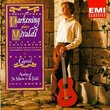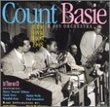| All Artists: Pierre Boulez Title: G. Mahler: Symphony no. 8 Members Wishing: 0 Total Copies: 0 Label: DG Original Release Date: 1/1/2008 Re-Release Date: 1/8/2008 Genre: Classical Style: Symphonies Number of Discs: 2 SwapaCD Credits: 2 UPC: 028947765974 |
Search - Pierre Boulez :: G. Mahler: Symphony no. 8
 | Pierre Boulez G. Mahler: Symphony no. 8 Genre: Classical
Legendary conductor Pierre Boulez brings his acclaimed Mahler symphonies cycle to a spectacular conclusion with this new recording of the monumental Symphony No. 8. Boulez teams up with Barenboim's Staatskapelle Berlin, th... more » |
Larger Image |
CD DetailsSynopsis
Album Description Legendary conductor Pierre Boulez brings his acclaimed Mahler symphonies cycle to a spectacular conclusion with this new recording of the monumental Symphony No. 8. Boulez teams up with Barenboim's Staatskapelle Berlin, the Berlin State Opera and Radio Choruses, as well as a strong cast of soloists including Michelle DeYoung, Johan Botha and Twyla Robinson to deliver his longawaited reading of what is arguably one of Mahler's biggest and most impressive scores, also known as "Symphony of a Thousand" due to the large number of musicians needed to perform the piece. This release crowns a more-than-decade-long project involving all the symphonies and major orchestral works of Gustav Mahler--a project that is both of highest personal value to Maestro Boulez and an important document of Mahler interpretation. Similarly Requested CDs
|
CD ReviewsA diaphanous, spiritual and very sophisticated Mahler 8 Mahler Fan | Hamburg, Germany | 01/09/2008 (5 out of 5 stars) "After a profoundly insightful reading of Mahler 2 recorded in Vienna, Boulez again opts for structural clarity, pure subtle tone and delicate textures in this gargantuan piece, bringing out details hardly heard before and finally saves the work from its latent aura of regression (thanks to Adorno's verdict): it never sounded more like a perfect link between the 7th and 'Das Lied von der Erde' than on this disc. In so many other recordings it seems as if increasing tempi would keep the work's immense forces from falling apart or, worse, delicate details are buried under crashing drums and full-throated choruses for dramatic effect. Boulez, who delivers one of the slowest Eighths on record, obviously had thought through the score far more perceptively. A composer-conductor like Mahler himself, Boulez demonstrates Mahler's unparalleled transparent instrumentation - every single note at its place, without frills, only serving the score's architectural clarity and overall trajectory. This approach already worked amazingly well in his reading of the 2nd : incredible, how down-to-earth and un-kitschy this work can be performed and how intense and colourful it suddenly sounds, liberated from obscure metaphysics. Boulez, whose ears have a reputation of being able to detect one single note played out of tune in a fortissimo cluster of sound, x-rays the score, revealing an architecture of steel and manages to keep the work's inherent passion and sensuality in balance with his crystal-clear objectivity and French esprit. For example, just listen to 'Gloria Sit Patri Domino', with its multiple themes kept distinct and clear while ecstasy and exuberant joy are constantly increasing in the repetition of the words Gloria! Gloria!. This is not just a roaring apotheosis, but shows how the movement had built up. In Part II, Goethe's poetry, with its forests, cliffs, deserts and mountain gorges, is transformed into a magnificent landscape. However, while Boulez is painting colours with sound, ascending ever upwards, it is the spiritual imagery he is evoking, not the picturesque. His reading comes very close to the image of a universe beginning to ring and resound that Mahler reportedly had in mind - with planets and suns revolving instead of human voices. Every little detail of the score is vividly laid bare - as if a bright light is radiating from within rather than spotlighting from outside. It is very interesting to learn that Goethe knew the 'Veni Creator Spiritus' hymn very well and even though it was intentionally illustrating the descent of the Holy Spirit, found it very appealing to the genius, attracting spiritual and creative people. Mahler must have felt the same way. Both parts of his 8th, although using words written a thousand years apart, are celebrating the triumphant universal power of the creative. With this recording, completing his Mahler cycle, the French Maestro again clearly defines Mahler's music as beyond a solely romantic emotional world. Leaving this composers many biographical subtexts completely aside, Boulez reveals Mahler's work as one of the most impressive examples in music literature of how expression totally assimilates into form and how the subjective objectivizes in art. I always had some reservations about Mahler 8, like Hans Pfitzner once has put it, responding to the opening chorus 'Veni,Creator Spiritus': But supposing He does not come. What if all the efforts go for nothing. After listening to Boulez's magnificent, ear-opening recording, the work no longer appears as such a throwback to me." Wonderful, but....... Good Stuff | 03/01/2008 (4 out of 5 stars) "Here we have another fine account of the Mahler 8. How strange it is to think back to the days when just a single stereo recording of this Olympian work in the catalog was thought to be a miracle. Also, this brings to a conclusion Pierre Boulez' traversal of Mahler's Symphonies. It has been, in all, a worthy undertaking and obviously yet another jewel in Boulez' crown. I like this Mahler 8 very much. I like several Mahler 8's very much. I like the clarity, the control, offered here. I like what I consider to be this maestro's ability to allow the music to speak for itself, perhaps the hallmark of a great conductor, which Boulez certainly is. He is to be congratulated for a career of artistic excellence, for a fine Mahler cycle, and for an excellent Mahler 8. However, after basking in the newness of this version, I find myself, yet again, going back to my old standby, the Solti/Decca 8. I've long since given up trying to figure out which is the best recording of a work so complex as this. All I know is that after every new version comes out, many of which I like very, very much, I always find myself returning to the Solti. And even though Solti is far from being my favorite conductor, it seems that, at least to my taste, he gets everything just about right here. Add to that the fact that he has a set of vocal soloists almost beyond belief, a dazzling orchestra, and, especially considering when it was recorded, those marvelous children of the dials - the Decca engineers, all working, it seems, as one, and you have what is, at least to me, a just about perfect recorded performance. I'm grateful for this new Boulez recording and I'm sure I will listen to it often and come to appreciate it all the more as time goes on. However, I will never part with the Solti. It, and I like to think I, have aged well together." A msterful Eighth, full of excitement and nuance, to crown B Santa Fe Listener | Santa Fe, NM USA | 01/10/2008 (5 out of 5 stars) "This is one of Boulez's most committed, heartfelt Mahler recordings, a major surprise after his coolly analytical Second. Part 1 is supercharged with excitement, and DG's engineering makes the orchestral and choral sonorities stupendous -- the visceral impact of Mahler's gigantic forces comes through as never before in my experience. The expected lapse of intensity when Part 2 begins isn't present at all.
Before hearing it, I wondered if an 80-year-old could marshal the number of perforrmers involved in the Eighth, but as ever, Boulez is a master of orchestral texture and detail. The Berlin Staatskapelle isn't in the same world-class league as the Vienna or Berlin Phil., but they play with conviction, and the chorus is among the best I've ever heard in this work. (The choral forces called for are so immense that a full professional complement can't be hired; we rely on amateurs, and these are top notch.) Assessing the soloists is more difficult. The light-voiced sopranos have probably been aided by the microphone, which suits me -- rather that than not hearing them at all. The men, as another reviewer points out, are stronger. But all are very good. Far more important to me than the pluses and minuses of the cast was the care that Boulez took to interpret every phrase. The Eighth isn't first-rate Mahler all the way through, and Boulez serves the score carefully and well, thinking about the expressive meaning of every episode. We've gotten past the point where performances of the Eighth sound like a struggle for all concerned. Ensembles around the world have conquered its difficulties (the way Gurre-Lieder, another hypertrophic masterpiece, has been tamed). As a result, actual interpreation is possible, and Boulez moves through the thinner passages of Part II with exceptional feeling. In all, I have no reservations -- this is a great Mahler Eighth and the crowning glory of Boulez's long traversal of the symphonies." |

 Track Listings (8) - Disc #1
Track Listings (8) - Disc #1





